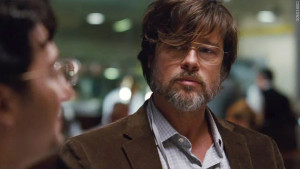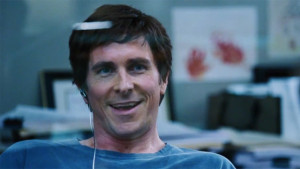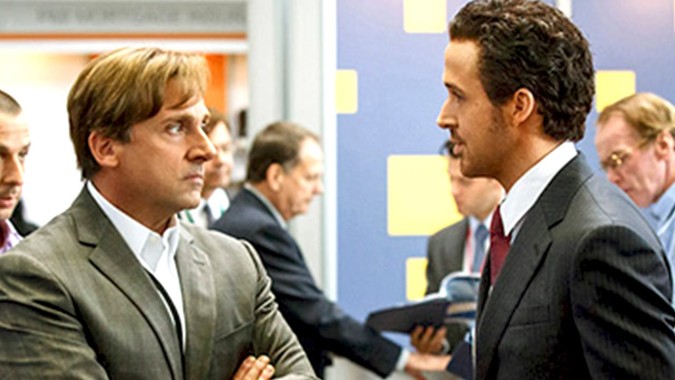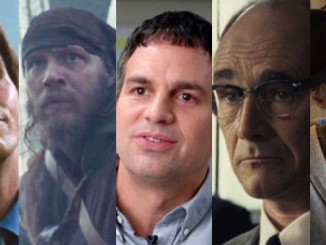Opened in limited release on December 11, director Adam McKay’s The Big Short goes wide today. You can read our review here.
Don’t understand some of the complex financial maneuvering that lead to the housing market collapse in 2007? Don’t worry, not even all of those who work in the financial industry understood those products and the impact that they would have, and ignorance that continues to this day.
“About 16% of Wall Street doesn’t know what a synthetic CDO is,” states writer/director Adam McKay. He is speaking after a screening of his new film The Big Short, based on the book by Moneyball author Michael Lewis, which tells the story of a small group of investors and analysts who saw the housing market bubble getting ready to burst. It may seem an unusual topic for the man who brought the raucous Will Ferrell comedy Anchorman: The Legend Of Ron Burgundy to the big screen, but McKay states that while he has always had an interest in politics, it wasn’t until he started work on another comedy that his interest was sparked.
When we did The Other Guys I really started researching the collapse, no one in the news was really telling you what happened. I was hearing pieces of information. I started reading books and I started asking questions, and finally I read The Big Short and said “This is THE book on the subject.” But I most struck by that it is really not that complicated. They took a bunch of mortgages, put them into a mortgage backed security, made a lot of money off of them, ran out of mortgages, put crappy mortgages in. That’s it. The end. I was kind of amazed about why don’t we know this.
So the more I started investigating this I was finding out that it is not an accident that these crazy terms exist, that they try to make you feel stupid when it comes to financial terms and economics. They don’t really want you nosing around in what they are doing… I have always been fascinated during this time by the difference between the experts and average people and why that gulf has gotten so wide and why most of us are told don’t worry about it. A lot of bad things have happened because of that.
 Excited by characters which he stated were “the perfect blend of entertainment and tragedy,” McKay reached out to Brad Pitt’s production company Plan B, who held the film rights to the book. After pitching them his take on the material, Pitt hired him on based on the inventiveness he wanted to bring to the project. One of the techniques McKay uses to keep the narrative from being bogged down by dry explanations about the financial concepts that are part of the plot is having people break the fourth wall and directly address the camera and audience to explain things. It was a device that he seen in other films and wanted to utilize it here.
Excited by characters which he stated were “the perfect blend of entertainment and tragedy,” McKay reached out to Brad Pitt’s production company Plan B, who held the film rights to the book. After pitching them his take on the material, Pitt hired him on based on the inventiveness he wanted to bring to the project. One of the techniques McKay uses to keep the narrative from being bogged down by dry explanations about the financial concepts that are part of the plot is having people break the fourth wall and directly address the camera and audience to explain things. It was a device that he seen in other films and wanted to utilize it here.
[Breaking the fourth wall] was one of my original ideas, as soon as I read [the book]. I love a movie called 24 Hour Party People, its one of my favorite movies. And American Splendor is another movie I love. I’ve always believed that you could do that if you get the right ratio of not doing it too much. And I knew the only way to tell a story as complicated as the financial esoterica is, you have to talk to the audience. I thought that was incredibly exciting given especially that the characters are so strong and the arc is so good. I really right away thought it was a chance to do a very different kind of film than you would normally see.
The Big Short has an impressive cast featuring the likes of Pitt, Steve Carell, Christian Bale and Ryan Gosling. McKay states that the lineup in the film is the “dream cast” he had while writing the screenplay and attributes the fact that they all agreed to do the film to the real life story they were telling.
I think everyone knows that this is one of the biggest stories of the last 100 years. Obviously climate change is pretty huge and there are a few others are in there. But what they really loved where the characters. The characters were so specific and wounded and vulnerable and yet lovable. So, everyone related to the character. But you can’t really separate the characters from the stakes and the stakes are so huge as well. They also really liked with what I was doing in breaking the fourth wall. They responded to the energy of that as well.
In some of his previous films, most notably the Anchorman films, McKay has used improvisation with his actors to explore scenes and find the best moments, usually funny ones. Because of the nature of the story being told, in The Big Short there was a greater importance to adhere to the screenplay. But McKay states that he didn’t abandon the idea of improv totally.
In this case I used improv more as a spice, where I would let them improvise for the cue into the scene. So they would do forty seconds of improv before the scene began. After three or four takes I would say to forget the script and feel free to talk over each other. I wanted to get that realistic patter to it. There was definitely some improv in there and they enjoyed that a lot but it was nothing like the other movies where you could cut a whole second movie out of the stuff that they did.
 As The Big Short is a mix of comedic and dramatic moments, it would be easy to categorize it as a dramedy, a docudrama or a black comedy. But McKay doesn’t see it that way.
As The Big Short is a mix of comedic and dramatic moments, it would be easy to categorize it as a dramedy, a docudrama or a black comedy. But McKay doesn’t see it that way.
I look at this movie as not in a genre. When you look at the real world there are no genres. So for these real people who went through this story, the first part of it was very exciting and kind of fun and harrowing and then when they realized ‘Oh wait a minute, we’re betting against ourselves, we’re betting against the entire world’ it became tragic. I think that there are a lot of genres mixed in there.
I also believe we’re going towards an age where genres aren’t going to hold up much anymore. I always think of movies like Something Wild with Melanie Griffith and Ray Liota where the first half is really fun and the second half is really scary. There’s a bunch of really cool movies that don’t adhere to one genre. And what was fun about this movie was that when it needed to be funny or energetic, I could let it be so, and when it needed to be tragic or heartbreaking I could let it do that by itself. I don’t think it’s a comedy in the traditional sense, but certainly there are some funny moments in it.
But whatever category people who see the film want to place it in, McKay is hoping that the film not only educates people about what happened in an entertaining way, but spurs them to talk about the issues The Big Short raises.
I was just really discouraged by seeing a lot of the presidential debates where, on both sides of the aisle, they were hardly talking about bank reform at all. It’s almost like we forgot. But it’s still going on, this collapse has not ended. All they’ve done is move the debt onto the government books. I would just love to see more conversation about it. And I would love to see regular people be part of the conversation more. I am tired of having to trust just four experts. It’s really not that hard. So if any kind of conversation came from this I would be very very happy. If bankers actually went to jail I would do a back flip, but I don’t think that’s going to happen.





